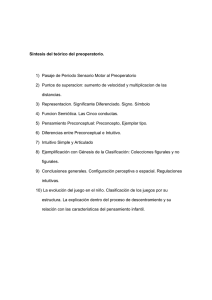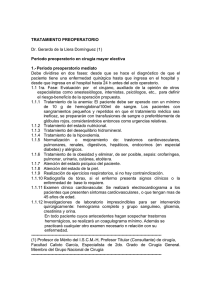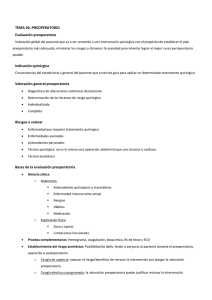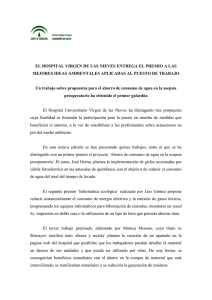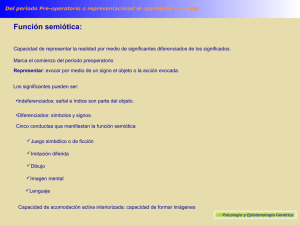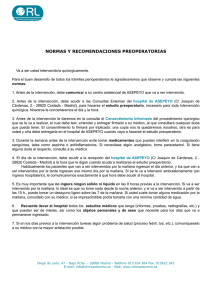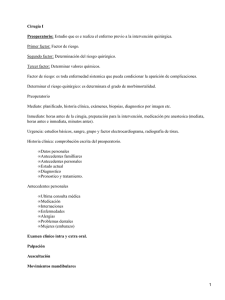27 Período Preoperatorio ppt
Anuncio
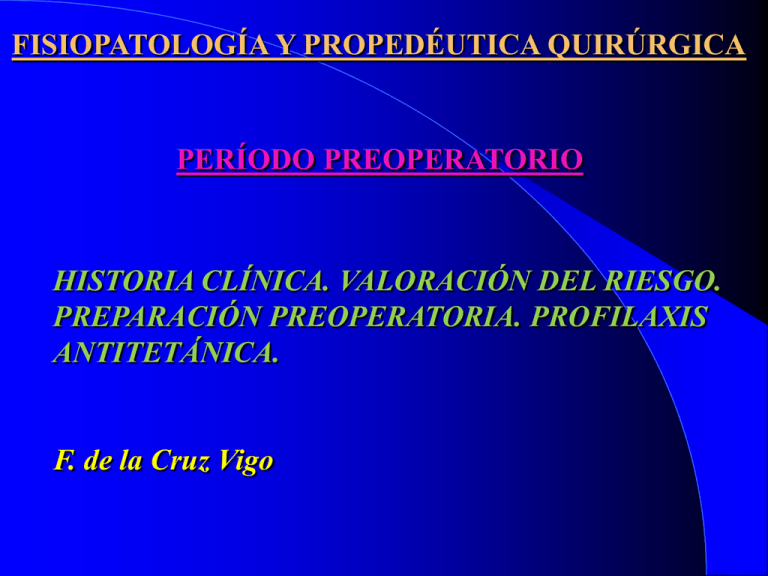
FISIOPATOLOGÍA Y PROPEDÉUTICA QUIRÚRGICA PERÍODO PREOPERATORIO HISTORIA CLÍNICA. VALORACIÓN DEL RIESGO. PREPARACIÓN PREOPERATORIA. PROFILAXIS ANTITETÁNICA. F. de la Cruz Vigo PREOPERATORIO EVALUACIÓN PREOPERATORIA Valoración global del paciente que va a ser sometido a una intervención quirúrgica con el propósito de establecer el plan preoperatorio más adecuado, minimizar los riesgos y disminuir la ansiedad para intentar lograr el mejor curso perioperatorio posible. PREOPERATORIO INDICACIÓN QUIRÚRGICA Circunstancias del estado local y general del paciente, que sirven de guía para aplicar un determinado tratamiento quirúrgico. PREOPERATORIO VALORACIÓN GENERAL PREOPERATORIA - Diagnóstico de alteraciones sistémicas del paciente - Determinación de los factores de riesgo quirúrgico - Individualizada - Completa PREOPERATORIO RIESGOS A VALORAR - Enfermedad que requiere tratamiento quirúrgico - Enfermedades asociadas - Antecedentes personales - Técnica quirúrgica - Técnica anestésica PREOPERATORIO BASES DE LA EVALUACIÓN PREOPERATORIA - Historia clínica - Pruebas complementarias - Establecimiento del riesgo anestésico - Información al paciente / consentimiento informado - Medidas de preparación preoperatoria PREOPERATORIO HISTORIA CLÍNICA INSISTIR: - ANAMNESIS - Antecedentes quirúrgicos o traumáticos - Enfermedad intercurrente actual - Alergias - Hábitos - Medicación - EXPLORACIÓN FÍSICA - Zona a operar - Limitaciones funcionales PREOPERATORIO PRUEBAS COMPLEMENTARIAS - Hemograma - Coagulación - Bioquímica - Radiografía de tórax - Electrocardiograma PREOPERATORIO RIESGO QUIRÚRGICO Posibilidad de daño, lesión o perjuicio al paciente durante el preoperatorio, operación o postoperatorio. - Cirugía de urgencia.- Sopesar el riesgo/beneficio de retrasar la intervención por alargar la valoración preoperatoria. - Cirugía electiva o programada.- La valoración preoperatoria puede justificar retrasar la intervención. PREOPERATORIO CLASIFICACIÓN DEL ESTADO FÍSICO (ASA) American Society of Aneshesiologists I – Sano II – Enfermedad sistémica leve, sin limitación funcional III – Enfermedad sistémica grave, limitación funcional IV – Enfermedad incapacitante con riesgo para la vida V – Moribundo, no sobrevivirá 24 h. VI – Muerte encefálica, extracción de órganos PREOPERATORIO OTROS FACTORES DE RIESGO PEROPERATORIO - Mal estado previo - Edad avanzada, obesidad, tipo de intervención - Cirugía de urgencia o larga duración - Experiencia del cirujano - Complicaciones anestésicas previas - Interacciones con anestésicos u otros fármacos - Calidad de cuidados anestésicos y postquirúrgicos PREOPERATORIO INFORMACIÓN / CONSENTIMIENTO INFORMADO - Derecho del paciente - De modelo paternalista a modelo de autonomía - Mitiga la ansiedad por lo desconocido - No exhaustivo, sino datos más importantes - Obligación legal, clave para aceptar la intervención - Documentos consensuados (Sociedades,…) PREOPERATORIO MEDIDAS GENERALES DE PROTECCIÓN - Prevención de la infección de la herida quirúrgica - Profilaxis tromboembólica - Ajuste de tratamientos específicos - Ayuno - Premedicación - Sedación preoperatoria - Analgesia - Protección neurovegetativa - Protección contra otros posibles riesgos PREOPERATORIO MEDIDAS DE PREPARACIÓN ESPECÍFICAS - Hipertiroidismo (enf. Graves,…) - Feocromocitoma - Cirugía colorrectal - Cirugía bariátrica -… PREOPERATORIO PROFILAXIS ANTITETÁNICA TÉTANOS QUIRÚRGICO – tener en cuenta - VACUNA - Generalmente en la 1ª infancia - Tras sufrir la enfermedad - Profesionales médico/quirúrgicos 3 DOSIS 2ª - de 4 a 8 semanas tras la 1ª 3ª - de 6 a 12 meses tras la 2ª DOSIS DE RECUERDO Cada 10 años PREOPERATORIO BÚSQUEDA BIBLIOGRÁFICA PUB MED U.S. National Library of Medicine National Institutes of Health Search: guidelines preoperative evaluation Limits: Review, English, published in the last 2 years Results: 1 to 20 of 42 1. Efficacy and safety of melatonin as an anxiolytic and analgesic in the perioperative period: a qualitative systematic review of randomized trials. Yousaf F, Seet E, Venkatraghavan L, Abrishami A, Chung F. Anesthesiology. 2010 Oct;113(4):968-76. Review.PMID: 20823763 [PubMed - indexed for MEDLINE]Related citations 2. European Society of Cardiology 2009 guidelines for preoperative cardiac risk assessment and perioperative cardiac management in noncardiac surgery: key messages for clinical practice. Hoeks SE, Poldermans D. Pol Arch Med Wewn. 2010 Jul;120(7-8):294-9. Review.PMID: 20693961 [PubMed - indexed for MEDLINE]Free ArticleRelated citations 3. State of the science: beta-blockers and reduction of perioperative cardiac events. Stephens S. Crit Care Nurs Clin North Am. 2010 Jun;22(2):209-15. Review.PMID: 20541069 [PubMed - indexed for MEDLINE]Related citations PREOPERATORIO BÚSQUEDA BIBLIOGRÁFICA PUB MED Display Settings: Abstract Surg Today. 2010;40(2):108-13. Epub 2010 Jan 28. Preoperative evaluation and a risk assessment in patients undergoing abdominal surgery. Neragi-Miandoab S, Wayne M, Cioroiu M, Zank LM, Mills C. Department of Surgery, St. Vincent's Medical Center, New York Medical College, School of Medicine, 130 West 12th Street, New York, NY 10011, USA. Abstract Patients who undergo abdominal surgery present along a variable spectrum of health. This ranges from the healthy young patient undergoing elective hemorrhoid surgery to the octogenarian in unstable health with multiple comorbidities. Regardless of a patient's current state of health, a preoperative assessment is crucial in planning the operative approach and in recognizing the possible postoperative complications for the implementation of a proper intervention if necessary. A broad evaluation of the patient includes identifying conditions that may predispose the patient to risks and the complications not directly related to the surgical procedure. The purpose of this article is to review the preoperative assessment in patients undergoing simple to complex procedures. The article provides general guidelines for the preoperative workup, which should be individualized for each patient, and the planned procedure, with the goal of reducing the postoperative complications. Risk stratification depends on a patient's condition and the extension of the planned surgical approach. It may also help to improve the postoperative outcome. A further preoperative workup should be individualized and tailored to the complexity of each case. PMID: 20107948 [PubMed - indexed for MEDLINE]
